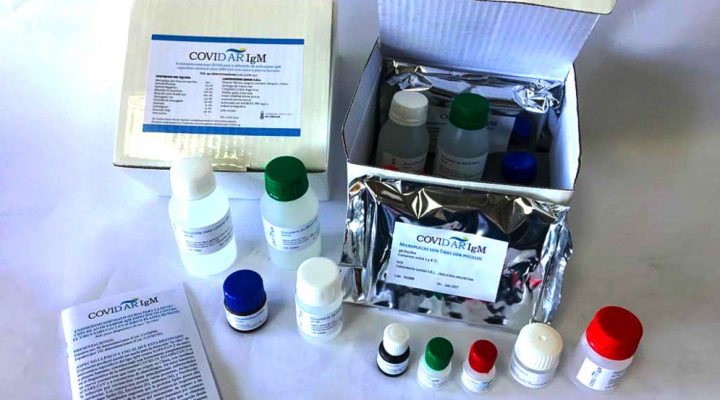COVID-19
The ANMAT approves a new national serological test that measures another antibody against the coronavirus
It is IgM, which was launched together with IgG, and could reveal if a person is or was infected.
Scientists at CONICET and the Leloir Institute Foundation (FIL) created a new serological test for COVID-19, which unlike “COVIDAR IgG”, detects another type of antibody that the body generally produces earlier against the infection by the new coronavirus, SARS-CoV-2. It was approved by the ANMAT. “This new development, COVIDAR IgM, detects IgM immunoglobulin, the first antibody the immune system generates to fight infection. Unlike IgG, it is present for less time in the patient’s blood. In the particular case of the new coronavirus, it can remain detectable up to two months and then begin to decline. While IgG lasts longer,” explained one of the project’s leaders, CONICET researcher Andrea Gamarnik, head of the ‘Molecular Virology Laboratory’ of the FIL.
IgM is produced before IgG and appears in 40% of the people infected in the first seven days after symptoms begin. “Positive results of this antibody mean that the person is or was infected,” explained Gamarnik.
“In the particular case of infection with the new coronavirus, IgG may appear a few days later but, surprisingly, we have noticed that in many cases it appears simultaneously with IgM,” said Diego Ojeda, postdoctoral fellow of the ‘National Agency for the Promotion of Research, Technological Development and Innovation (Agency I+D+i) and member of Gamarnik’s laboratory.
Although it is not known precisely how long the IgG lasts, considering the data obtained with other coronaviruses such as SARS-CoV-1, immunity may last a year. “This is an intensive study and there are still no patients who have passed that period of time since the start of the pandemic. For this reason, it is important to undertake research that allows the monitoring of patients by measuring the level of antibodies after the moment of infection,” said CONICET scientist María Mora González López Ledesma, member of Gamarnik’s team.
The research team is working with professionals of the Hospital de Clínicas “José de San Martín”, led by Beatriz Perazzi, who are monitoring patients by measuring IgG and IgM levels over time. “These studies are very important because they will allow us to accurately determine the duration of each of these two antibodies.” Gamarnik explains.
The new IgM test is useful as a complement to the IgG test. It can be added to tests that seek to assess the circulation of the virus in the community, and could also complement strategies for the identification and isolation of cases and contacts.
Through the use of SEROKIT, a piece of validated equipment for the recollection and conservation of antibodies in samples of a drop of blood, anaysis of seroprevalene of COVID-19 are being undertaken in the City of Buenos Aires and studies for the care of health staff in the province of Buenos Aires. ELISA method is used for those samples in the Laboratory with the COVIDAR IgG and IgM tests.
About 200,000 serological tests are being produced per month: 160,000 IgG and 40,000 IgM. They are available to the national, provincial and City of Buenos Aires health authorities and are distributed to more than 70 hospitals and clinics in the country.
Both kits have been distributed in the City of Buenos Aires, and in the provinces of Buenos Aires, Chaco, Formosa, Córdoba, Corrientes, Santa Fe, Neuquén, Santa Cruz, Rio Negro, Chubut, Tucumán, Entre Ríos, San Luis and Tierra del Fuego.
The Argentine serological tests were also developed by Marcelo Yanovsky and Julio Caramelo, CONICET researchers and chiefs of FIL laboratory; Diego Álvarez, CONICET researcher at the ‘National University of San Martin’; other doctoral fellows and young doctors that are part of Gamarnik’s team: Horacio Martín Pallarés, Guadalupe Costa Navarro y Lautaro Sánchez; y Jorge Carradori, del Laboratorio Lemos.
The project is part of the “Unit Coronavirus COVID-19” launched by the Ministry of Science, Technology and Innovation (MINCyT) and the support of the Mercosur Convergence Fund (FOCEM), Fundación Williams and the Asociación Civil Siempre Ayuda Nunca Dañes (SAND).
